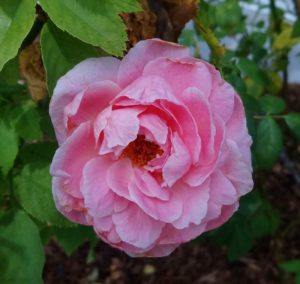The end of summer is a great time to enjoy roses in the garden. Brazoria County Master Gardeners are celebrate rose culture during Open Garden Days at our demonstration garden, Brazoria Environmental Education Station we affectionately call BEES, 583 Hospital Drive in Angleton. We offer presentationa on old garden roses, give demos on proper rose planting, tips for taking cuttings and how to maintain and water your rose garden. Don’t forget to browse on our events portion of our webpage for the opportunity to check out our gardens, the best kept secret in Angleton.
This is also the perfect time to prune some of your roses to encourage a flourish for fall blooming. I mention some because pruning techniques and timing depends on the type and variety of rose that you own and is dependent on the growth habit and vigor of the plant. Keep in mind that you should always provide annual maintenance pruning such as cutting out dead and diseased branches as they occur. Regarding variety specific maintenance, best pruning practice for antique roses is shaping with a light trimming to keep a full form. We are encouraging a display of many blooms rather than the single cut flowers expressed from hybrid tea or grandiflora roses you may see at the florist shop or grocery store. The same technique of shaping the canopy is best used for polyantha, Knock Out® and drift roses, which are roses with a shrubby habit. The exception to this class of roses are the spring blooming antiques that you would prune just after spring flush and then maintenance pruning of dead wood. One popular rose in our area that blooms in spring and fall is Peggy Martin, an easy-to-grow vigorous climbing thornless rose. Cane pruning and shaping for Peggy Martin rose should be committed after the first spring bloom.
Smith County Horticulture agent and garden writer Greg Grant recommends hybrid tea, grandiflora and floribunda roses should be pruned around Labor Day and Valentine’s Day annually. Their average pruning height in fall is around three feet, leaving taller growing varieties to four feet. Remove about one-third of the canes for fall, and one-half for a spring pruning. Always use a good pair of sharp pruning shears and loppers for larger canes, and don’t forget to wear leather gloves for protection. The serious rosarian may consider arm-length leather or Kevlar gloves when pruning your thorny friends. Fine pruning includes making all cuts at a 45-degree angle no more or less than one-quarter inch above a vigorous outward facing bud. Most commercially grown modern roses may have been budded on a rootstock, which is a plant with roots that support a grafted desired variety. Always remove sucker growth that is growing at or below the graft scar/union to discourage growth of an unwanted variety. As we drop into the cooler months of fall, your roses offer the potential for a heavy blooming season. Apply a cup of organic dry rose fertilizer after a light fall pruning and supplement with liquid feed two weeks after as applicable to your situation. Discontinue fertilization after the beginning of October to allow for a dormancy period during our winter.
A few varieties you may consider adding to your landscape and appropriate for our region are suggested by Kathy Huber of the Houston Chronicle. Coincidentally, these are also roses promoted by Texas A&M AgriLife Extension Service Earth-Kind® program and a few from Extension’s Texas Superstar® program: medium shrubs are Belinda’s Dream, Caldwell Pink, Katy Road Pink and Mutabilis; small shrubs are Marie Daly and Perle d’Or, climbers are Climbing Pinkie, Peggy Martin and Sea Foam. Don’t forget to check our events webpage to attend our Open Garden Day at BEES (583 Hospital Drive) to discover additional favorites that perform in our sub-tropical region from Brazoria County Master Gardener experts. We have a small rose garden we are proud to show off and provide you with sustainable rose gardening tips and information. Browse to our website for info about upcoming programs: https://brazoria.agrilife.org/, you can always email me directly with any gardening questions at: sbrueggerhoff@tamu.edu, and I look forward to seeing you in the garden.

